|
This weekend I’m celebrating a small victory. As a self-published author, I wear many hats. I am the sole proprietor of Murky Press, a small publishing business. I manage my business taxes and licensing requirements. I keep records of sales and inventory. I manage the business website and a variety of software licenses that help me do all the work. I publish through Amazon and IngramSpark, and I maintain accounts with each of those companies as well as with companies that provide my web domain and host my website and manage my ISBN numbers. I’ve written recently about my rather lackadaisical marketing efforts, but I do try to come up with creative ways to get the word out about my books. BC (before COVID) I would spend time at book fairs and speak to small community groups. I post regularly to this blog to stay in touch with all of you. And then, of course, I have to write the damn books. That may require research assistance, travel, and coordination with editors and cover designers and possibly illustrators. I do my own page layout and book design for both printed books and ebooks, so I am spared contracting with even more individuals for that work. Of all these myriad tasks, however, the one that gives me the biggest headache is troubleshooting technical problems. Now long, long ago, I worked in the tech industry and I prided myself in keeping up with technology advancements. But I’m way past that. Things change, sometimes dramatically, every three to six months now. I’m no longer interested in keeping up, and I only fall farther and farther behind with each calendar year. So I dread wrestling with technology problems. And they befall us all, whether we’re simply trying to manage a smart phone or an online business. For a couple of months now, I’ve been trying to get to the bottom of the “Not secure” message that had appeared next to the Murky Press web address in some browsers. A couple of my loyal blog readers had expressed concern about encountering dire warnings relating to stolen passwords and credit card numbers. Let me state up front that the Murky Press website was never risky to visit. I do not request passwords or credit card numbers from anyone. But I know it was unsettling to see those messages. It was for me. And I learned this summer that it could seem downright scary for some of you. Today, as you access the Clearing the Fog blog, you may finally see a closed lock symbol indicating that the site is now secure. Whew. I hope all those frightening messages have gone away. I didn’t really do anything, in the end. But after multiple phone calls and online chats, I finally got my domain provider to talk to my website host. They changed one number in my IP address and voilà—I have now been certified as the legitimate owner of this website. The cynic in me wonders if this recent security requirement—an “SSL certificate” for those of you in the know—is simply a way to justify staffing up the customer support lines and thereby expanding business. Perhaps if I were selling products from my website I would have more patience for this stuff. Nonetheless it appears I have finally solved the riddle. I finally have a website that won’t scare the bejesus out of my loyal visitors. Thanks to all of you for trusting me during these uncertain times. So raise a glass with me to one small victory over the worldwide website warlords! They stole hours and hours of my time, but you can now read future blogs with a sense of total security.
4 Comments
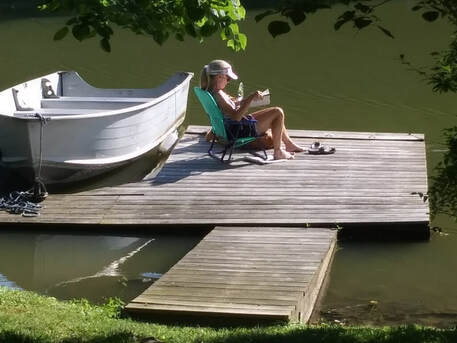 How I’ve spent my summer marketing Next Train Out. Photo by Rick Showalter. How I’ve spent my summer marketing Next Train Out. Photo by Rick Showalter. As traditional book fairs, author readings and, yes, book launch parties remain taboo, digitally savvy authors come up with creative ways to alert likely readers to their new books. The rest of us rely on friends, family, and colleagues to spread the word. Once the pandemic tightened its sticky little fingers around our collective throats, I pretty much gave up on marketing. I tried to focus on the blog, just to stay in touch with all of you. But I largely threw up my hands and said, “It’s God’s will.” Then I sat on my butt and ate bonbons. Slowly, however, as the initial shock of the lockdown lifted, the wheels of the old network began to grind. Thirty years of job-hopping started to pay off. A couple of folks I exchanged pleasantries with during my working days felt sorry for me and offered to help. First, Tom Eblen, formerly with the Lexington Herald-Leader and now the literary liaison with the Carnegie Center for Literacy and Learning in Lexington, Ky., reached out to me about doing an online reading to post on the Center’s Facebook page. Being the Luddite and contrarian I am, I’m not on Facebook. But I figured millions are, so surely two or three potential readers might become bewitched by the tale of Lyons and Effie Mae. I grumblingly agreed. After a couple of technical glitches, I managed to submit a seven-minute reading that suited his purposes. Then Tom Martin poked his head up from all the reporting the pandemic had generated for his weekly radio program on WEKU, Eastern Standard. Tom and I had planned to do this interview in April, but waiting until July gave me plenty of time to rest up before I had to perform again. Tom is a consummate interviewer—and an excellent editor. He can make anyone sound good, thank goodness. I know some of you caught the original airing of this interview on July 16. Now I figure if I sit patiently in my office—or on my dock—maybe another opportunity or two will come. Perhaps I’ll even sell a couple more books. Meanwhile, I’ll continue to lean on the excuse that there’s not a damn thing I can do to market this book during a pandemic. Coming upOn Thursday, July 30, at 11 a.m. on WEKU’s Eastern Standard, Tom Martin will present his remarkable summary of the conversation I had on July 15 with George Carter’s great-nephew, Jim Bannister. Listen to a preview. If you can’t catch the original airing, it will be available from Eastern Standard’s archives afterwards. I’ll write more about this experience for Clearing the Fog soon. That post will include links to the WEKU broadcast and to various newspaper articles about the conversation.
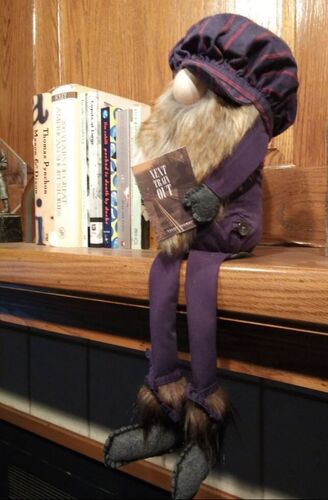 Everyone’s reading NEXT TRAIN OUT! Even this winsome locomotive engineer, handcrafted by my talented friend and neighbor, Lynne Craft. Everyone’s reading NEXT TRAIN OUT! Even this winsome locomotive engineer, handcrafted by my talented friend and neighbor, Lynne Craft. As a socially awkward introvert, I don’t always look forward to parties. But I was really, really looking forward to celebrating the release of Next Train Out with you. As I’m sure you have surmised by now, it is necessary to postpone our book launch party scheduled for April 5. We have also postponed my April 14 presentation before the Anderson County Historical Society. I am terribly disappointed. But none of us wants to play any role in inadvertently spreading this dangerous virus. We hope there will be a time later this year when we can come together and raise a glass of “Bourbon on the Tracks” in celebration. But now it is critical that we all heed the recommendations of our governor and the CDC and remove ourselves from society as much as we possibly can. The good news? It’s a great time to read! I hope you’ll consider ordering a copy of Next Train Out from Amazon. If you prefer, contact me here and I’ll mail you a copy. I’ll warn you that elements of the book may now hit a little close to home. There are references to the 1918 flu pandemic, as well as the 1929 stock market crash and its aftermath. I had no clue, of course, as I was writing the book how eerily familiar this period in our history might feel to contemporary readers. Since I can’t see you in person, I hope you’ll drop me a note or call to let me know what you thought. I’m finding that readers frequently are curious about what in my grandfather’s story is fact and what is fiction. I’ll be happy to pull back the curtain a bit if you’re interested. Finally, let me say, most importantly, how grateful I am for you interest. Please, do everything you can to stay safe and healthy during these trying times. 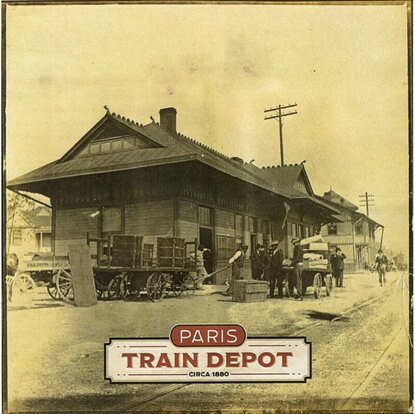 In 2017, the Poynter family acquired the historic Paris train depot and began a careful and loving renovation of the property. It is now the Trackside Restaurant and Bourbon Bar, the site of our book launch party April 5. In 2017, the Poynter family acquired the historic Paris train depot and began a careful and loving renovation of the property. It is now the Trackside Restaurant and Bourbon Bar, the site of our book launch party April 5. I did it. Next Train Out is published. For those of you who have faithfully followed the twists and turns of my adventures writing a novel, this is supposed to be the sweet spot. The pinnacle. But I largely feel relief. And fear. What did I miss? What did I forget to do? Was I right to scale back Effie’s vernacular? Should I have expanded the story, given that there were so many more details to share? It’s time to find my way to acceptance. I am a severe taskmaster, but at some point I had to cut the cord and release this product of hard work and imagination to you. I hope it will find a few readers. I hope some of those readers will find Effie Mae and Lyons memorable. I hope the twentieth-century story will shed some light on the issues we’re still facing today. Thank you, again, for coming with me along this journey. Your words of encouragement and support are what finally got me to the finish line. If you decide to read the novel, I would be further indebted if you would consider writing a few words about your response to it on amazon.com. (Scroll to the bottom of the page to see where you can submit a review or a video.) Or send me your comments for a blog post. Either might encourage others to give it a look. Meanwhile I invite all of you to join us for the official book launch April 5 at the very train depot in Paris, Ky., where I have imagined Lyons first made the decision to turn his back on his family and his reasonably secure life. We’ll have music provided by Carla Gover—traditional Appalachian singer, songwriter, instrumentalist, and clogger—playing Effie Mae’s favorite music, and special food created by Trackside Restaurant’s chef John Wheeler to represent dishes evocative of the narrative’s historic period and geographic region. On April 14, I’ll be speaking about Lawrenceburg’s ties to the story at the monthly meeting of the Anderson County Historical Society. Everyone is welcome at both events. (Details) Many of you have asked, “What’s next?” My usual response: “Retirement!” I consider myself a “one-and-doner.” But Effie Mae’s words may better reflect what's in store for me: “It’s all part of life’s road map that I have no way of reading. I just take the turns as they come.” 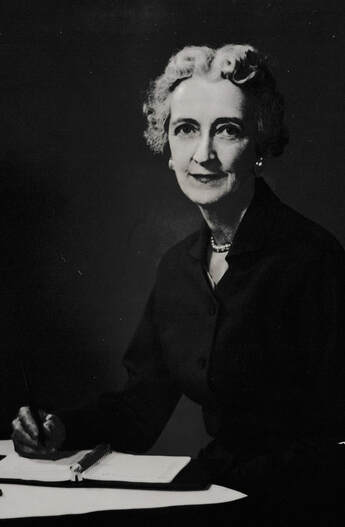 Mary Louisa Marrs McWilliams (1894-1977). Photo provided by Bob McWilliams. Mary Louisa Marrs McWilliams (1894-1977). Photo provided by Bob McWilliams. After my great-aunt Mary McWilliams suffered her final stroke, she was lying in a hospital bed, largely unresponsive. I approached her bedside with some trepidation. I was 17. I had something important to tell her. “Mamaw,” I said, “I’ve decided to go to Centre College.” She smiled. She did not respond verbally. She did not open her eyes. But she heard me, and she was pleased that I had finally decided to follow her to her alma mater. At the time, I wasn’t particularly happy about that decision. I had wanted to go far, far away from Kentucky, far away from Lawrenceburg. I had never quite found my footing in my parents’ hometown after being dislocated from Baltimore shortly after my father died. I was still largely alien to my classmates. But I was set to graduate from Anderson County High School in a couple of months, and I had finally accepted my mother’s arguments for going to a school 30 miles away rather than one hundreds of miles away. Knowing that Mamaw approved made the choice a little more palatable. I was happy that I had shared some news in her final days that made her happy. It sometimes seems ironic to me now that I am spending so much time digging into my ancestors’ stories and learning about Lawrenceburg’s history. I had hoped I had gotten away for good when I went on to graduate school in North Carolina. But I unexpectedly ended up back in Kentucky, and somehow I have never left. So now I am looking forward to joining over 30 other authors at the Anderson Public Library’s First Annual Book Fest on Saturday, October 19. It feels a bit like a homecoming. As I’ve traveled to various communities in the last two years sharing the story of Pud and Bobby down on Salt River, I’ve begun to feel pride in my Anderson County roots. Under my cousin Sandy Goodlett’s patient tutelage, I’ve learned how widespread my ties to the county are. It seems appropriate that this event will be at the beautiful, recently renovated Anderson Public Library. Adjacent to the library’s front door is a portrait of Ann McWilliams, Mary McWilliams’ daughter-in-law, who dedicated a decades-long career to improving the viability of that local institution and making it a proud testament to the community’s curiosity and love of reading. Mary McWilliams’ sister, Nell—my grandmother—worked at the old Carnegie library on Woodford Street, which is now the Anderson County Tourism Office and History Museum. Growing up, I spent many hours in both buildings. My mother made sure of that. For me, the library was always a welcoming place that offered spellbinding riches: all the books you could read. For free. Now, of course, libraries offer so much more. I hope you’ll make plans to stop by Saturday, October 19, between 10 a.m. and 2 p.m. and say hello. It’s an honor to be there to represent the story of an Anderson County native and chat with my Anderson County family. 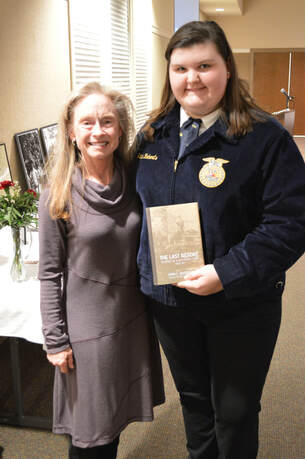 Katlin Roberts, right, the Bourbon County winner of the conservation essay contest. Katlin Roberts, right, the Bourbon County winner of the conservation essay contest. One of the unexpected joys (or terrors, depending on when you ask me) of having published The Last Resort has been the opportunity to talk about the book to various civic or environmental groups. On Tuesday, I spoke to nearly a hundred farmers and civic leaders in Paris, Ky., at the Bourbon County Conservation District’s 60th Annual Dinner Meeting. The food, prepared by a men’s group at the Church of the Annunciation, was outstanding and the crowd was friendly and welcoming. I was honored to donate a generous honorarium for my presentation to the Woods & Waters Land Trust, an organization dedicated to protecting forests and streams in the Lower Kentucky River watershed. The theme for the Kentucky Department of Natural Resources’ annual essay and art contests, sponsored by the local conservation districts, was “Diggin’ It”: soil as the foundation of life. I had little trouble connecting that theme to my father’s love of the rural central Kentucky land and his collaborative research with soil scientists and geologists later in his career. A quote from one of his contemporaries, which was included in the event brochure, summed up the focus of the evening: “Essentially, all life depends upon the soil…There can be no life without soil and no soil without life; they have evolved together.” –Charles E. Kellogg, third Chief of the USDA’s Bureau of Chemistry and Soils, 1938 A presentation last October before the Anderson County Historical Society led to another unexpected invitation: putting together an exhibit about my family history at the newly refurbished Anderson County History Museum. I spent a good deal of time this spring talking with family members and collecting photographs and other memorabilia for the display. It has been exciting to work on a project that connected my father’s side of the family—featured in The Last Resort—with my mother’s side of the family—featured in the novel (tentatively titled Next Train Out) that I’m about to wrap up. In the photos below, the portraits on the wall are of George Dennis McWilliams Sr. (1893-1982) and Mary Marrs McWilliams (1894-1977), my great uncle and aunt. The exhibit will be on display from April 2 through at least the end of the month. If you can find an excuse to travel to downtown Lawrenceburg, I hope you’ll stop by and take a look. We’ve left a notebook there for you to record your comments, insights, or any family stories of your own you’d like to share.
Anderson County History Museum 108 East Woodford Street Lawrenceburg, KY 40324 502-598-3127 The museum is inside the Tourism Office, just around the corner from Main St., in the old Carnegie library building (where my grandmother Nell Marrs Board worked for many years). It’s generally open weekdays during regular business hours, but you may want to call before you go. Kendall Clinton, the executive director of the Lawrenceburg/Anderson County tourism commission, may also be able to arrange a weekend visit, upon request. 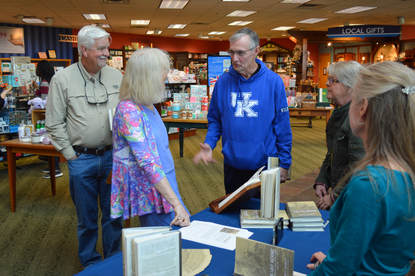 Friends and family stop by a book signing earlier this year. Friends and family stop by a book signing earlier this year. When David Hoefer and I started working on The Last Resort, we realized that the book could appeal to a variety of readers. Most obviously, I expected the people who had known Pud would have a sentimental attachment to the stories of his youth. From there, it occurred to me that others of his generation or perhaps folks who had grown up in similar rural communities would enjoy reminiscing about a time long gone. As the project evolved, we began to think that other audiences might find something of interest in the book. Folklorists might find the boys’ customs or food ways a window into cultural norms of the time. Historians might appreciate the journals and the World War II letters as primary source materials that paint a specific tale of how one man navigated the journey to adulthood during a tumultuous period in our nation’s history. Botanists and biologists might be interested in the flora and fauna that Pud noted were prevalent in central Kentucky 70 years ago. Or they might find the awakenings of a young scientist a compelling story. I also felt it was, at its simplest, a good story. People who enjoyed reading biographies or short stories would find it an enjoyable glimpse into a bygone era. A year later, I believe we have in some small way tapped into all of these audiences. The book has helped me reconnect with family members of my father’s professional colleagues and childhood friends. I have heard from historians who have used the book in their classes. A handful of my father’s students have shared the book with their fellow scientists, in places as far-flung as New Zealand. Over the next several weeks, I’ll have a chance to connect personally with some of these readers. I am grateful for all of them. I am happy that David convinced me to see this project through. And I’m looking forward to finding out what about the book piques the interest of each individual. On Tuesday, Oct. 9, I’ll have the privilege of talking to members of the Lawrenceburg community, the now bustling central Kentucky town where Pud and Bobby and Rinky and Lin Morgan grew up. At the regular monthly meeting of the Anderson County Historical Society, I expect to see friends and family members of the boys who spent time at The Last Resort camp along Salt River. I expect they will share more stories of what life was like in that rural community in the 1940s. For them, it will be a nostalgic trip down memory lane. On Wednesday, Nov. 7, I have been invited to participate in the Kentucky Authors and Poets event in nearby Frankfort, Ky., sponsored by the Kentucky Conservation Committee. I expect the audience there will include conservationists and environmentalists who work every day to preserve Kentucky’s waterways and woodlands. That audience may be more interested in John C. Goodlett the pioneering ecologist and plant geographer, or perhaps in the field notes of 19-year-old Pud Goodlett the University of Kentucky biology student. I share with them an interest in preserving the natural areas along Salt River and Elkhorn Creek and the Kentucky River so future generations can have experiences akin to those of the young boys at The Last Resort And on Saturday, Nov. 17, I will be surrounded by more than 150 authors at the 37th annual Kentucky Book Fair sponsored by Kentucky Humanities. Some of the authors gathered there will present formal programs, and we will all be available to talk to curious readers and sign books. I will be humbled by the presence of Wendell Berry, Bobbie Ann Mason, Silas House, and Sarah Smarsh, among others. On that day, my likely audience may be avid readers of Kentucky history or readers looking for Christmas gifts for aging parents or grandparents. Publishing this book has been a sometimes surprising journey. I am thankful for all the people who’ve expressed a genuine interest in the project. I hope you’ve enjoyed coming along for the ride. 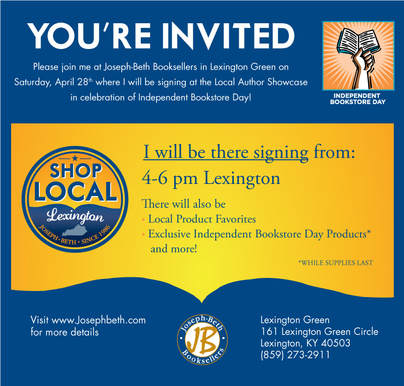 I’ve recently come to understand that writing is simply a series of decisions. We all have the essential vocabulary and familiarity with English syntax necessary to put words on a page. But every word, every phrase, every metaphor, every construction is a choice. If you’re writing fiction, every setting, every plot complication, every character’s reaction, every character’s character is likewise a choice. If I had understood this earlier, I sincerely doubt I would have launched so heedlessly into this vocation. I am typically paralyzed by decision making. When I was in college, I took a class called Cognitive Processes. I was fascinated by psychology and it was taught by one of my favorite screwball professors. Early in the semester I recall discussing how many decisions, large and small, we make each day. For a short period thereafter I froze as I stood in the cafeteria line trying to select something for breakfast. I had never before thought of that simple task as a series of decisions. Daily existence became almost unbearably cumbersome. For the writer, even if you survive the thousands of decisions necessary to complete an essay or short story or, heaven forbid, a novel, you are then faced with hundreds more related to marketing the work. During my checkered career, I learned that marketing has at least one thing in common with teaching: you can always do more. You can always be more imaginative, do more research, connect with more people, prepare more thoroughly. It’s open-ended. You are limited only by resources and time. Mostly time. Unless you are slavish to a data-driven method, marketing usually results in some hits and some misses. You make the best choices you can given what you know and the time you have to invest. It’s always a bit of a crapshoot. And that can make it particularly rewarding when some of the choices you make result in real opportunities to get the word out about a favorite project. On Saturday, April 28, I will have the privilege of participating in the Local Author Showcase celebrating Independent Bookstore Day at Lexington’s oldest—and largest—independent bookstore: Joseph-Beth Booksellers. Anyone who has spent time in central Kentucky in the past 25 years is familiar with the multi-level wonderland that is Joseph-Beth. It has been a key local source for books and gifts for two generations of readers. It’s one of the places that defines Lexington as a city that embraces literary artists, reading, and the life of the imagination. If you have a chance to stop by Saturday between 4 and 6 p.m., I would love to chat with you about The Last Resort or anything else on your mind. While you’re there, pick up something special for yourself or a gift for someone else. We can choose to support our local independent booksellers just as we choose the first words that open a story. 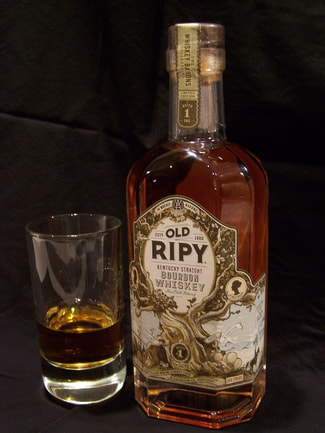 (Photo by Rick Showalter) (Photo by Rick Showalter) My husband and I had planned to be in Lawrenceburg Saturday to enjoy the Anderson County Art Trail and check in with those businesses downtown that are graciously selling The Last Resort (many thanks to The Mrs. Cox Shop and Tastefully Kentucky). Before we left home, however, we discovered that actor Matthew McConaughey was at the Wild Turkey distillery that morning to help volunteers distribute 4,500 Butterball turkeys to Lawrenceburg families. Now, McConaughey has been working with Wild Turkey as a spokesperson for a couple of years, so his appearance is not entirely a surprise. Nonetheless, Lawrenceburg is not always a traditional stop for celebrities who come to central Kentucky for horse races or movie filming. (OK, we have to cite the exception: the filming of George C. Scott’s “The Flim-Flam Man” in downtown Lawrenceburg before its 1967 release.) By the time we got downtown, everyone was abuzz with excitement. The streets were packed and every parking space was filled. McConaughey had made a favorable impression among townspeople as a friendly and generous individual. Bourbon distilling has been a critical driver of the Lawrenceburg economy since the mid-1800s, in part because of plentiful water sources from the Salt and Kentucky Rivers and the natural filtration of the limestone rock in the area. An Irish immigrant opened Ripy Brothers distillery at the current site of Wild Turkey, high above the Kentucky River east of Lawrenceburg, in 1869. Before Prohibition, Anderson County was the home of more than a dozen distilleries. By the 1940s, however, two stalwarts had survived: Ripy Brothers, now Wild Turkey, and Old Joe’s, currently Four Roses. Pud mentions both in The Last Resort. As a nod to this rich local history, the parent company of Wild Turkey, Campari, recently announced plans to reintroduce two pre-Prohibition brands of bourbon as part of its Whiskey Barons Collection: Bond & Lillard and Old Ripy. (These were very limited releases and may no longer be available at retail outlets.) The company is making every effort to replicate the original Old Ripy recipe, under the watchful eye of Ripy family descendants. A portion of the proceeds will go toward the ongoing restoration of the majestic T.B. Ripy home, originally built in the 1880s on South Main Street in Lawrenceburg. Pud’s buddy Bobby Cole was a descendant of the Bond family that produced the Bond & Lillard brand, which won the Grand Prize at the 1904 World’s Fair in St. Louis. Campari is using the judges’ tasting notes from the World’s Fair to develop the new recipe. The Bonds had been distilling bourbon in Anderson County since 1820. Today, the Bourbon Trail brings thousands of tourists to Kentucky each year, and the various distilleries vie to build the most accommodating visitors center and offer the most appealing small batch bourbons. Certainly the Anderson County distilleries are no exception. Pud and Mary Marrs enjoyed drinking Kentucky bourbon and introducing it to their friends across the country during a time when bourbon did not have the high profile it does today. I have to think they would be delighted to know that Hollywood celebrities are helping bourbon distilleries attract new customers and invigorate their hometown community. 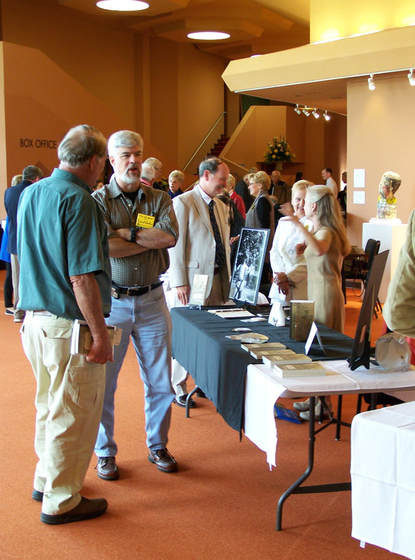 David Hoefer, second from left, author of the Introduction to The Last Resort, talks with Dr. Michael Hamm, professor emeritus of history at Centre College. David Hoefer, second from left, author of the Introduction to The Last Resort, talks with Dr. Michael Hamm, professor emeritus of history at Centre College. On Saturday I was on the campus of Centre College in Danville, Ky., for a book signing event. The previously quiet lobby and art gallery of the beautiful Norton Center became considerably noisier as more and more people arrived for the 11:30 alumni recognition ceremony. Folks were milling about the tables where a number of authors were prepared to introduce their books to the crowd. A robust-looking older gentleman and his smiling wife approached our table and picked up a copy of The Last Resort. I glanced quickly at their name tags, which identified them as members of the class of ’48 and ’46 respectively. I immediately recognized that they would be about the same age as some of the boys who visited Pud’s camp—which meant they might have a genuine interest in the book’s first-person account of a time they would remember. Before I could formally greet them, the gentleman looked at the author’s name and said, “Goodlett, huh? I used to know a Vince Goodlett in Frankfort.” I smiled broadly. “Well, that would be my uncle, the oldest brother of the author.” “One of the best attorneys of his time,” he continued. “With Hazelrigg & Cox, you know.” And thus began a wonderful conversation with this couple who still reside in Frankfort. With so many of their generation no longer with us, it was just amazing to stumble into someone who knew my uncle well, who had fond memories of Vincent Goodlett, who died in 1973. During the event that morning I was able to reconnect briefly with a number of other people who have danced through my life: classmates and professors and people I admired from afar. I also chatted at length with a few who were inspired by the work we had done capturing a piece of family history. So many of us have possession of stories or letters or diaries that we find fascinating and that we’re fairly certain other readers or history buffs would enjoy. Sometimes we just need a little nudge to take that first step toward sharing them. I hope the publication of The Last Resort will encourage others to dig into the documents their families have preserved. Day by day we’re losing an entire generation—a generation whose lives spanned incredible changes in our country and who played pivotal roles in both building and preserving this nation. I wish I had had more time to talk to the couple who stopped by our table and learn more about their own stories. I hope they enjoy reading about Vince’s younger brother and the close bond that existed between the two. At the next book signing, I think I’ll be more prepared to listen rather than talk. |
Details
Archives
June 2023
Categories
All
|

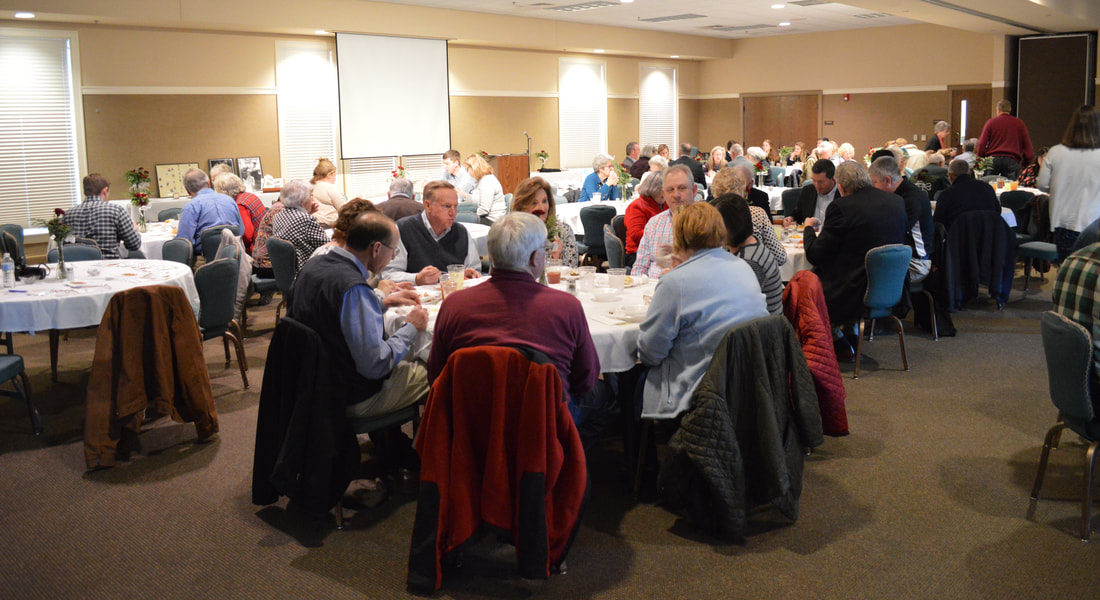

 RSS Feed
RSS Feed